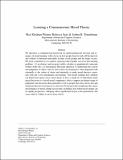| dc.contributor.author | Kleiman-Weiner, Max | |
| dc.contributor.author | Saxe, Rebecca R | |
| dc.contributor.author | Tenenbaum, Joshua B | |
| dc.date.accessioned | 2018-10-12T15:55:53Z | |
| dc.date.available | 2018-10-12T15:55:53Z | |
| dc.date.issued | 2017-10 | |
| dc.date.submitted | 2017-02 | |
| dc.identifier.issn | 0010-0277 | |
| dc.identifier.uri | http://hdl.handle.net/1721.1/118457 | |
| dc.description.abstract | We introduce a computational framework for understanding the structure and dynamics of moral learning, with a focus on how people learn to trade off the interests and welfare of different individuals in their social groups and the larger society. We posit a minimal set of cognitive capacities that together can solve this learning problem: (1) an abstract and recursive utility calculus to quantitatively represent welfare trade-offs; (2) hierarchical Bayesian inference to understand the actions and judgments of others; and (3) meta-values for learning by value alignment both externally to the values of others and internally to make moral theories consistent with one’s own attachments and feelings. Our model explains how children can build from sparse noisy observations of how a small set of individuals make moral decisions to a broad moral competence, able to support an infinite range of judgments and decisions that generalizes even to people they have never met and situations they have not been in or observed. It also provides insight into the causes and dynamics of moral change across time, including cases when moral change can be rapidly progressive, changing values significantly in just a few generations, and cases when it is likely to move more slowly. Keywords: Moral learning; Hierarchical Bayesian models; Social cognition; Moral change; Value alignment | en_US |
| dc.language.iso | en_US | |
| dc.publisher | Elsevier | en_US |
| dc.relation.isversionof | https://doi.org/10.1016/j.cognition.2017.03.005 | en_US |
| dc.rights | Creative Commons Attribution-NonCommercial-NoDerivs License | en_US |
| dc.rights.uri | http://creativecommons.org/licenses/by-nc-nd/4.0/ | en_US |
| dc.source | Kleiman-Weiner, Max | en_US |
| dc.title | Learning a commonsense moral theory | en_US |
| dc.type | Article | en_US |
| dc.identifier.citation | Kleiman-Weiner, Max et al. “Learning a Commonsense Moral Theory.” Cognition 167 (October 2017): 107–123 © 2017 Elsevier B.V. | en_US |
| dc.contributor.department | Massachusetts Institute of Technology. Department of Brain and Cognitive Sciences | en_US |
| dc.contributor.approver | Kleiman-Weiner, Max | en_US |
| dc.contributor.mitauthor | Kleiman-Weiner, Max | |
| dc.contributor.mitauthor | Saxe, Rebecca R | |
| dc.contributor.mitauthor | Tenenbaum, Joshua B | |
| dc.relation.journal | Cognition | en_US |
| dc.eprint.version | Author's final manuscript | en_US |
| dc.type.uri | http://purl.org/eprint/type/JournalArticle | en_US |
| eprint.status | http://purl.org/eprint/status/PeerReviewed | en_US |
| dspace.orderedauthors | Kleiman-Weiner, Max; Saxe, Rebecca; Tenenbaum, Joshua B. | en_US |
| dspace.embargo.terms | N | en_US |
| dc.identifier.orcid | https://orcid.org/0000-0002-6067-3659 | |
| dc.identifier.orcid | https://orcid.org/0000-0003-2377-1791 | |
| dc.identifier.orcid | https://orcid.org/0000-0002-1925-2035 | |
| mit.license | PUBLISHER_CC | en_US |
